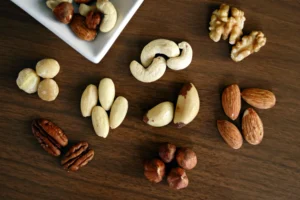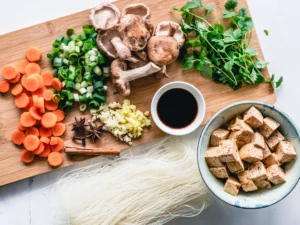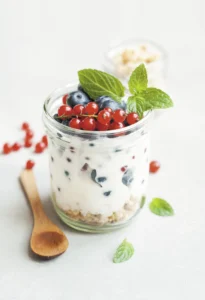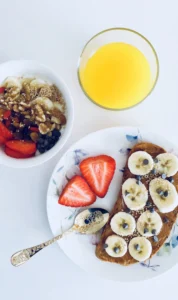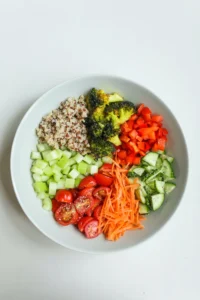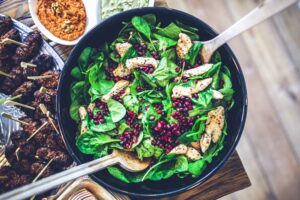Generated by Contentify AI
- Introduction
- The Importance of a Balanced Diet
- Essential Nutrients for Pregnant Women
- Foods to Include in a Pregnancy Diet
- Foods to Avoid During Pregnancy
- Managing Nausea and Food Aversions
- Making Healthy Snack Choices
- Meal Planning and Preparing Healthy Meals
- Staying Hydrated
- Conclusion

Introduction
Ah, pregnancy – it’s a joyous time to bring a new life into the world. However, it’s also a time where health and nutrition become increasingly important. After all, you’re not just eating for yourself anymore – you’re eating for two! That’s why eating a healthy and balanced diet during pregnancy is so important.
Eating well during pregnancy has a number of benefits. It helps ensure that both you and your baby are getting the essential vitamins, nutrients, and minerals needed for a healthy development. Eating well during pregnancy can also help reduce your risk of complications such as preterm labor, gestational diabetes, and high blood pressure.
But how do you go about eating healthy during pregnancy? Here, we’ll explain the basics of healthy eating during pregnancy, including nutritious snacks, foods to avoid, and other tips to make sure you and your baby get the nutrients you need. Read on to find out more!
The Importance of a Balanced Diet
When it comes to having a healthy pregnancy, a balanced diet is extremely important. Eating the right foods and getting the right amount of vitamins and minerals can help ensure that both you and your baby are getting the nutrition you need.
A balanced diet during pregnancy consists of a variety of foods, including fruits, vegetables, whole grains, protein sources (such as lean meats, eggs, and legumes), dairy, and healthy fats. Eating a variety of foods helps ensure that your body is receiving all the essential nutrients it needs for healthy development. Pregnant women should pay special attention to getting enough iron, calcium, and folate.
In addition to providing essential nutrients, a balanced diet helps you keep your energy levels up. Eating regular meals throughout the day can help keep your energy levels at an optimum level, especially during the first trimester when nausea and fatigue can be common. Eating healthy snacks between meals can also help you maintain your energy levels.
Maintaining a balanced diet during pregnancy is also important for managing your weight gain. Eating a wide variety of healthy foods can help you ensure you’re getting the right amount of calories while avoiding overeating. It can also help prevent excessive weight gain, which can have long-term health implications.
Finally, a balanced diet can help reduce your risk for other pregnancy complications, such as gestational diabetes, preeclampsia, and preterm labor. Eating the right foods and getting enough of the right nutrients can help reduce the risk for these conditions and ensure a healthier pregnancy.
In conclusion, a balanced diet is essential for a healthy pregnancy. Eating a variety of nutritious foods and getting the right amount of vitamins and minerals can help ensure that both you and your baby are receiving the essential nutrients you need. So, be sure to eat a variety of fruits, vegetables, whole grains, lean proteins, dairy, and healthy fats to ensure a healthy pregnancy.
Essential Nutrients for Pregnant Women
Expecting a baby is a time filled with excitement, anticipation, and a lot of changes. One of the most important changes for pregnant women is the shift to healthy eating, and making sure the food they’re consuming is providing essential nutrients for their growing baby.
In this blog, we’ll take a look at some of the key nutrients pregnant women need to ensure their bodies are getting the right nutrients for both their own and their baby’s health.
First and foremost, pregnant women need an adequate supply of folic acid. Folic acid helps prevent neural tube defects such as spina bifida and anencephaly, and it’s essential for baby’s healthy development. Folic acid can be found in leafy green vegetables, nuts, seeds, and fortified bread and cereal.
Calcium is another important nutrient for pregnant women. Not only does it help with mom’s bone health, but it’s also necessary for baby’s developing skeletal system. The body absorbs calcium best when paired with Vitamin D, so pregnant women should choose dairy products, fortified foods, or a calcium supplement that also contains this vitamin.
Iron is a key nutrient for pregnant women, as it is essential for carrying oxygen to baby’s developing cells. Iron can be found in lean red meat, poultry, fish, beans, spinach, and fortified bread and cereal.
The last essential nutrient pregnant women need to be aware of is omega-3 fatty acids. Omega-3 fatty acids are important for baby’s eye and brain development, and can be found in fish, flaxseed, soybeans, and walnuts.
Pregnant women should always consult with their health care provider when it comes to their diet during pregnancy, as each woman’s body and baby’s needs may vary. Eating a balanced diet of protein, fruits, vegetables, and fortified grains is always best. But focusing on these four essential nutrients—folic acid, calcium, iron, and omega-3 fatty acids—can help ensure that mom and baby are getting the nutrients they need.
Foods to Include in a Pregnancy Diet
Pregnancy is a time of immense physical and emotional transformation, and a healthy diet is key to ensuring that both mother and baby stay in top shape. Eating a balanced diet during pregnancy can help to reduce the risk of complications such as gestational diabetes, preterm birth, and low birth weight. Not to mention, the right foods can also help to boost the mama-to-be’s energy levels!
So, what foods should you be incorporating into your pregnancy diet? Here are some of our top picks:
Fruits and veggies: Colorful fruits and veggies are packed with vitamins and minerals that are essential for baby’s growth and development. Try to include at least two to three servings of fruits and veggies in each meal.
Protein-rich foods: Foods such as chicken, turkey, beef, eggs, fish, lentils, and tofu pack a protein punch. Protein helps to build the baby’s muscles and organs and also keeps mama feeling full and satisfied.
Whole grains: Whole grain foods such as oatmeal, quinoa, buckwheat, and brown rice supply essential vitamins, minerals, and fiber to both mother and baby.
Dairy: Dairy products such as milk, yogurt, and cheese provide calcium and vitamin D, which are both important for healthy bones and teeth.
Healthy fats: Foods such as nuts and seeds, avocados, and olive oil are rich in healthy fats. These are important for proper brain and nerve development.
With the right mix of nutritious foods, mamas can give their bodies and their babies the best chance for a healthy pregnancy. Bon appétit!
Foods to Avoid During Pregnancy
One of the most important things to consider when it comes to healthy eating during pregnancy is the foods that should be avoided. Most notably, pregnant women should avoid certain types of fish, such as shark, swordfish, mackerel, and tilefish, which can contain high levels of mercury. Additionally, raw seafood should be avoided, as it can contain parasites and bacteria that can potentially cause foodborne illnesses.
Processed meats, such as hot dogs, sausages, and deli meats, should also be avoided during pregnancy, as they can contain high levels of nitrates, which have been linked to an increased risk of birth defects and miscarriage. Caffeine should be limited to no more than 200 mg per day, as it can increase the risk of dehydration and low birth weight.
While it’s important to pay attention to the foods you’re eating, it’s equally important to pay attention to the beverages that you’re consuming. Alcoholic beverages should be avoided during pregnancy, as they can lead to fetal alcohol spectrum disorders. Additionally, soft drinks and energy drinks can contain high levels of caffeine, artificial sweeteners, and other unhealthy ingredients, and should be avoided as well.
Finally, unpasteurized dairy products, such as unpasteurized milk and cheese, should be avoided, as these products may contain bacteria that can be harmful to both the mother and the baby. All pregnant women should consult with their healthcare provider before making any changes to their diet. By avoiding the aforementioned foods and beverages, pregnant women can help ensure a healthy and happy pregnancy.
Managing Nausea and Food Aversions
The arrival of a baby is one of the most exciting times in a woman’s life. But along with the joy comes the challenge of eating healthy while pregnant. Many women experience nausea and food aversions during pregnancy, making it difficult to maintain a healthy diet.
Nausea during pregnancy can lead to an overall decreased appetite, leading to missed meals and a lack of essential nutrients. The good news is that there are strategies you can employ to manage nausea and food aversions. Here are a few tips to help you stay healthy:
• Eat small, frequent meals throughout the day. This will stabilize your blood sugar and keep nausea at bay.
• Eat bland foods like crackers, toast, and bananas. These provide essential nutrients without being overly stimulating to the senses.
• Avoid foods that are high in fat, sugar, and spice. These foods can make nausea worse.
• Focus on what you can eat, rather than what you can’t. You may have to be a bit creative, but you can still find nutritious foods that won’t aggravate your nausea.
• Get plenty of rest. Your body needs all the energy it can get to fight off nausea and aversions.
• Stay hydrated. Dehydration can make nausea worse, so be sure to drink plenty of water and other fluids.
• Avoid smells that trigger nausea. If there are certain smells that seem to make matters worse, avoid them as much as possible.
• Talk to your doctor. In some cases, medications may be able to help with nausea and food aversions.
Managing nausea and food aversions during pregnancy can be a challenge, but with a few simple strategies and a bit of creativity, you can maintain a healthy diet.
Making Healthy Snack Choices
When it comes to healthy eating during pregnancy, making the right snack choices is essential. Snacking is an important part of a healthy pregnancy diet, helping to provide your body with the nutrients it needs to support a growing baby.
It’s best to avoid processed snacks like chips and candy and focus on nutritious options instead. Good snacks provide energy, keep you full between meals, and give you the nutrition you need to help your baby grow.
Some delicious, nutritious snacks to consider include:
Fruits and Veggies: Fruits and vegetables are a great source of vitamins, minerals, and fiber. For a refreshing snack, try fruit-infused water, smoothies, or snack bars.
Dairy: Low-fat dairy products provide high-quality protein and calcium. Try yogurt, cheese, and milk.
Nuts and Seeds: Nuts are a great source of healthy fats like monounsaturated and polyunsaturated fatty acids. Try adding almonds, walnuts, sunflower seeds, and pumpkin seeds to your diet.
Whole Grains: Whole grains contain fiber and B-vitamins, both important for a healthy pregnancy. Try whole-grain breads, cereals, and crackers.
Lean Meats and Fish: Protein helps to build and maintain muscle. Try snacking on lean cuts of beef, pork, poultry, fish, and eggs.
Legumes: Legumes like lentils, beans, and peas are packed with protein and fiber. Try adding them to salads, soups, or have them as a snack.
Snacking can be a great way to get the nutrients and energy your body needs during pregnancy. Keep in mind that portion sizes are important—choose snacks that are lower in calories but high in nutrients. With the right choices, you can ensure that you and your baby are getting the nutrition you need to stay healthy.
Meal Planning and Preparing Healthy Meals
Meal planning and preparing healthy meals can be a daunting task for any expecting mother. With conflicting advice about what is safe to eat and what is off-limits, it can be hard to know what to eat – and how to prepare it. Luckily, there are a few tips and tricks for making meal planning and preparing healthy meals during pregnancy a breeze.
One of the most important aspects of healthy eating during pregnancy is to eat a balanced diet. Make sure to include all the food groups in your meals, such as fruits, vegetables, grains, dairy, and protein, and try to choose healthy options like whole grains, lean proteins, and low-fat dairy. If possible, try to make meals at home, as this is usually the healthier option, and try to include plenty of leafy greens and other colorful fruits and vegetables.
When it comes to meal planning, it can be helpful to plan your meals ahead of time. Choose a few recipes to make throughout the week and make a list of ingredients you will need. This way, you can easily shop for the necessary ingredients and get dinner prepped and ready to go.
When preparing meals, it’s important to keep food safety in mind. Always wash your hands with soap and warm water before handling any food and wash fruits and vegetables thoroughly before eating. When cooking meats, make sure they’re cooked through and use a food thermometer to ensure that they’re safe to eat.
Finally, don’t forget about portion sizes. It can be easy to overindulge when it comes to food during pregnancy, so make sure to keep portion sizes in mind. Healthy snacks can help satisfy those cravings without overindulging, so try to include plenty of nutritious snacks throughout the day.
By following these tips, meal planning and preparing healthy meals during pregnancy can be a breeze. From planning ahead and shopping for ingredients to keeping food safety in mind and watching portion sizes, you can easily ensure that you’re eating well throughout your pregnancy.
Staying Hydrated
Being pregnant can be an exciting but also overwhelming experience. Eating a healthy and balanced diet is essential for the health of you and your baby. In addition to eating a variety of nutrient-rich foods, staying hydrated is also key. A pregnant woman needs more fluids than usual to stay healthy and hydrated.
Fluids are vital for healthy digestion, transporting nutrients in the body, and helping your body’s cells to function correctly. During pregnancy, the body’s fluid needs increase even further as the baby needs plenty of fluids to grow and develop. Dehydration can lead to uncomfortable symptoms such as headaches, dizziness, and fatigue.
It’s important to aim to drink 8-12 glasses of fluids each day. This includes water, milk, and other unsweetened beverages such as herbal teas. To make sure you’re getting enough fluids, it’s a good idea to carry a reusable water bottle with you at all times. That way, you’ll always be able to take a sip when you need it.
It’s also best to avoid drinks with added sugar, such as sodas and sweetened teas. These drinks do not provide any nutritional benefits and can lead to unhealthy weight gain. Similarly, caffeinated beverages like coffee, energy drinks, and soda should be limited. Caffeine can cause dehydration and interfere with your body’s absorption of iron, an essential mineral for pregnant women.
By staying hydrated, you’ll be able to enjoy a healthy pregnancy and keep your energy levels up. You’ll also be able to keep up with the other important aspects of eating well during pregnancy, such as eating a balanced diet, taking prenatal vitamins, and avoiding certain foods. So don’t forget to drink up!
Conclusion
The importance of eating a healthy diet during pregnancy cannot be overstated. Eating healthy during pregnancy is essential for the growth and development of your baby. Eating nutritious foods helps ensure your baby will be born healthy and stay healthy during their early years. A healthy diet during pregnancy can help prevent serious health problems for both mother and baby.
It is important to remember that a healthy diet during pregnancy is not about depriving yourself of special treats, but rather about making smart choices and eating a variety of healthy foods. Eating a variety of healthy foods from all the major food groups is key to ensuring you and your baby get the essential nutrients for growth and development.
By making small changes to your diet such as eating more fruits and vegetables, incorporating lean protein sources, selecting whole grains, and limiting unhealthy fats and added sugars, you can make a big difference in your health and the health of your baby. Pregnancy is a special time and creating good dietary habits during this time is a great way to ensure a healthy and happy baby.

